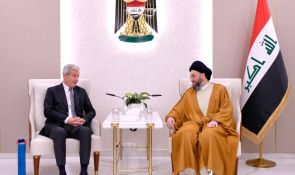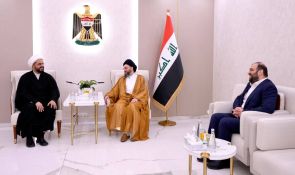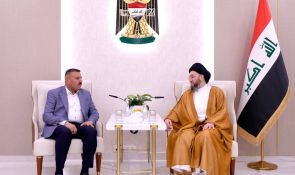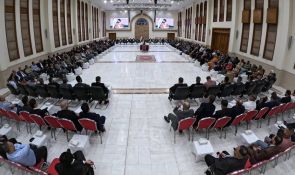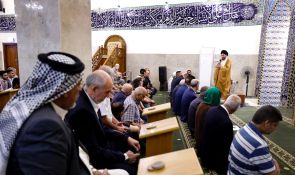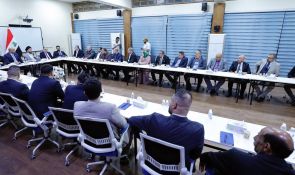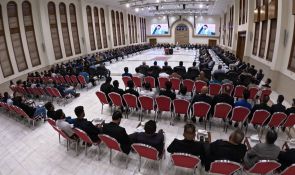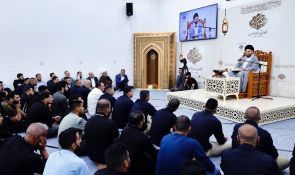Sayyid Ammar al-Hakim lauds the awareness of the Iraqi youths of the challenges of the phase, describing them as “makers of the future.”
Sayyid Ammar al-Hakim has called for putting in place a security strategy to limit the violations the country is witnessing, explaining that leniency in holding political and security officials to account is regarded as forging a partnership with the terrorists.
The Head of the Islamic Supreme Council of Iraq (ISCI) renewed his call to the politicians in his speech in the Weekly Forum on Wednesday, September 12, 2012 to “use frankness and disclosure instead of trenching behind an arsenal of provocative statements.” He pointed out to the political reforms needing a gradual process and not raising the demands among the politicians.
Counter-Terrorism Strategy
Sayyid Ammar al-Hakim advocated putting in place a security strategy to limit the security violations which the country is witnessing, including the recent terrorist attacks in a number of Iraqi governorates, demanding the security establishment to take the initiative from the hand of terrorism and shift from the status of defense to that of pursuit and to discover and seize these networks. He stressed the necessity of admitting the fragility of the security situation and of not taking the ability of the terrorists lightly in as far as their choice of (place, time and type) in carrying out their criminal operations. He called for identifying the derelict officials for such security gaps, to acquaint people with their identity and to present them to the authorities so they may receive their fair penalty.
Sayyid al-Hakim explained that the leniency by political and security officials in holding derelict individuals to account is regarded as forging partnership with the terrorists. He pointed out saying, “An official who is not shaken by these explosions, and the officer who is not moved by the terrorist storms, is a partner in them.”
His Eminence also called for holding those in charge of putting failed security plans to account, pointing out to the need to support the intelligence establishment and to grant the opportunities to loyal and competent officers who still complain about a shortage of support and resources which these security services have. He explained that the responsibility is one of solidarity in facing terrorism between the official and the citizen.
The Head of the Islamic Supreme Council of Iraq (ISCI) called on all spectrums of the Iraqi people, whom he described as a “bouquet of Iraqi roses”, to unite, solidify and stand in the face of plans which try to harp on the sectarian tones and thus aggravate the sectarian tension in the country, stressing that “The unity of our people and our solidarity will prevent the achievement of the lowly objectives of terrorism.”
Al-Hakim explained that the Iraqi street holds the political class a portion of these violations, regarding the politicians’ feuds and occupation with their own gains have led to such security gaps taking place. His Eminence warned, through what he had already pointed out in his sermon during the congregational prayer service of the blessed Eidul-Fitr, saying, “The nation’s project is in a state of jeopardy,” explaining that terrorism is blind and will never exclude anyone, that everyone has the responsibility to face and challenge it, pointing out to the need to face terrorism from cultural corners and backgrounds and not confine it to military treatment.
Gradual Reforms
Sayyid Ammar al-Hakim stressed that the national reforms plan represents an important prelude among the political contenders, calling for “the use of frankness and disclosure instead of trenching behind an arsenal of statements which provoke others.” He pointed out that the political reforms need a gradual process, and that the ceilings of demands among the politicians must not be raised, in addition to the necessity of mutual concessions among the political groups in order to achieve the national reforms, explaining the significance of classifying the demands into short, medium and long term ones.
Iraqi Youths and the Facebook Page
Sayyid Ammar al-Hakim lauded the patriotic spirit and the awareness of the phase’s challenges and seriousness on the Iraqi field among the Iraqi youths adding, “I am overwhelmed by pride and glory as I read the youths’ comments on my Facebook page who are not older than 18 speaking the language of unity, participation and patriotism.” He called on the Iraqi youths to cause those who try to stir the sectarian feuds to lose their chance, and to look towards the future with awareness and realization of the size of danger lurking for the nation, expressing his optimism of the role of the Iraqi youths by saying, “We augur well, and we sense hope in the making of a glorious future for our generations, and of changing our reality to the better.”
International Resolutions Incriminating Abuse of Symbols and Beliefs
Sayyid Ammar al-Hakim condemned the unjust targeting of the Prophet of mercy and humanity, Prophet Muhammed (Õ) through the medium of abusive films, programs and caricature drawings in the pretext of the label of freedom, calling for the issuing of clear international resolutions that incriminate such abuses of symbols and beliefs of all religions, explaining that freedom does not permit abusing people’s beliefs, nor does it trespass on their liberty in expression and belief, calling on the Muslims to restraint themselves and to express themselves through the use of civilized ways that spell out the Islamic religion’s tolerant Message.
His Eminence denounced the attacks on the shrines of men of God and of the righteousness in Egypt, Tunisia, Syria, Libya and many Arab countries, explaining that they are unjust attempts that try to harm these sites that are regarded as historic roots, and it is an unacceptable aggression, hoping the Arab and Islamic governments will deal strongly in facing these infringements.
Misan Initiative: Entitlement of Homeland and Citizen
Sayyid Ammar al-Hakim explained that his initiative to rehabilitate Misan is not about only Misan; rather, it will leave its good effects on the Iraqi reality. He added saying that there is a big gap between the oil wealth owned by Misan and the reality in which the citizens of the governorate live. He pointed out that, “The rich state is the one that has big organizational capabilities in development and integrity, and it avoids the wasting of public funds and of extravagance.”
Seriousness of Postponement and Tampering with Election Deadlines
His Eminence also renewed his warning of the seriousness of postponement and tampering with the set deadline for the elections, explaining that, “We do not want to live an electoral vacuum. We also do not want to live a security vacuum,” expressing his support for limiting the number of the Higher Electoral Commission to 9 seats instead of increasing them to 15, explaining that increasing the number requires spending salaries and concessions that exhaust the state budget which opposes the public will and the will of the religious authorities.
Support for Iraqi Initiative in Four Countries’ Meeting
Sayyid Ammar al-Hakim expressed his welcome of the meeting of the four countries (Turkey, Iran, Egypt and Saudi Arabia) to discuss the Syrian conditions and help alleviate the suffering of the brotherly Syrian people, pointing out to the political and peaceful solutions providing an opportunity for the Syrian citizens restoring their rights as included in the Iraqi initiative for resolving the Syrian crisis. He stressed that Iraq has strong relations and ties with all spectrums and components of the Syrian people, in addition to its regional role in presiding over the Arab Summit, explaining that they are important elements which Iraq has and which render it a main party in such deliberations, calling for the development of the Iraqi initiative and making it an effective side in tis regional effort to resolve the Syrian crisis.
White Terrorism: Terrorism of Excessive Speed
Sayyid Ammar al-Hakim called for the need to tackle the phenomenon of traffic incidents that have reached 96,000 casualties last year according to official statistics, describing this phenomenon as the “white terrorism” and pointing out to the roads in the country now being called “death highways” because of the repeated horrific traffic incidents, calling on the specialized authorities to re-do street plans, set places for pedestrian crossings, etc., and the need to spread traffic awareness in the news media.


